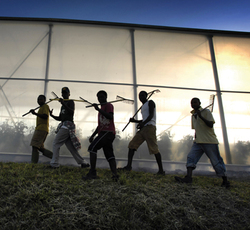Written by FINNIGAN WA SIMBEYE
The government will soon table a Contract Farming Bill in parliament, seeking to enact a law to protect smallholder farmers and rural communities against exploitation by private investors.
Principal Legal Officer with the Ministry of Agriculture and Food Security Audax Rutabanzibwa said in Dar es Salaam over the weekend that among other things, the law will clearly state the kind of crops to cultivate and nature of relationship between private investors and rural farmers.
Dr Rutabanzibwa, presenting a paper on Agriculture land as stipulated in the 1999 Village Land Act at Agriculture Council of Tanzania meeting, said that there is a lot of complaints against private investors acquiring tracts of land and engaging smallholder farmers as out-growers.
“The problem comes when investors try to change land use plan…someone might come in to cultivate rice but soon changes to jatropha against the initial agreement,” Dr Rutanzibwa pointed out. He said there is need to return to post independent title deeds inherited from colonial power, clearly stating which crops to grow where.
“The law will also address the issue of investors’ over-exploitation of local farmers whom they engage as out-growers,” he said, noting that current crops boards were obliged to protect smallholder farmers from exploitation. Dr Rutanzibwa noted that the government’s focus under Kilimo Kwanza is to improve productivity of smallholder farmers who dominate the country’s agriculture sector, saying initiatives such as Southern Agriculture Growth Corridor of Tanzania is directed towards smallholder farmers.
“Under SAGCOT, the key concept is for investors not to replace smallholder farmers but to complement them,” he pointed out.
Sokoine University of Agriculture Director for Centre for Sustainable Rural Development, Professor Deogratias Rutatora said the government should ensure that villages have land use plans in place.
“The land use plan should clearly state the kind of crop to be grown in an area so that when someone comes to invest they know exactly what to do in the allocated area,” Prof Rutatora noted, warning that the trend of investors changing the uses of land as they wish was detrimental to the country’s future.
With over 44 million hectares of arable land, the country is said to cultivate only 10.5 million hectares which means that a lot of land lies idle but yet conflicts do persist. “The law should clearly state which regions grow which crops so that investors can be allocated appropriate areas when seeking to acquire land for farming,” said ACT Chairman Salum Shamte.














